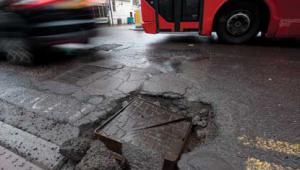By Richard Johnstone | 9 May 2013
Councils could start to ‘fail’ their communities if the government imposes further cuts in the June Spending Review, the Local Government Association warned today.

An LGA analysis of council funding modelled the likely impact on services if the government's June Spending Review were to slash an average upper-tier council’s grant funding by 10% in 2015/16. This is slightly more than the average annual 8.5% reduction planned in the current Spending Review period running to March 2015.
The LGA's submission to the government concluded that a host of local services would be hit, including children’s centres, libraries, museums and sports facilities. In addition, the budget for fixing potholes could be slashed and streetlights switched off overnight.
Councils would be reduced to spending almost all their money on statutory responsibilities, such as adult social care services and waste collection, according to Anycouncil.
Ahead of the Spending Review on June 26, the LGA urged ministers to take steps to ensure many local services were ‘not placed on the endangered list’.
These included adjusting the current ring-fence around the Whitehall health and schools budgets to give town halls access to these funds. The LGA said money from these budgets could be spent more effectively on council services, such as pre-hospital care for the elderly and infirm or early intervention for troubled children and their families.
Today’s submission also called on Whitehall to increase the proportion of business rates devolved to town halls from the current level of 50%, set at the start of 2013/14 financial year. It also reiterated previous calls for the government to lift borrowing restrictions on councils for house building, and called for ministers to back more Community Budget pooled spending initiatives.
LGA chair Sir Merrick Cockell said councils had so far borne the brunt of cuts to public spending, with total cuts of 33% planned in the current Spending Review period from April 2011 to March 2015.
‘Councils were already the most efficient part of the public sector before the current spending round,’ he said. ‘Over the past three years they have worked tirelessly to deliver new efficiencies through measures such as sharing services, restructuring the workforce and reducing senior pay. This work can only go so far in reducing the impact of funding cuts on local services.
‘In many council areas we have now reached a stage where noticeable cuts to local services are a mathematical certainty unless the next spending round places local government finance on a sustainable footing.’
Cockell has also warned that plans to alter the referendum trigger for local referendums on council tax increases, set out in yesterday’s Queen’s Speech, represented ‘a new threat to funding for essential local services’.
Local Government Secretary Eric Pickles confirmed that the 2% cap would now apply to increases set by local quangos, such as waste disposal authorities and integrated transport authorities, as well as town halls.
But Cockell said this placed ‘a further limit’ councils' ability to raise income, which is already constrained by the cap.
‘Levies are often dictated by central government agencies and therefore beyond the control of local authorities. In some cases this will mean council services will have to absorb the costs of decisions over which the local authority has no control.’





















